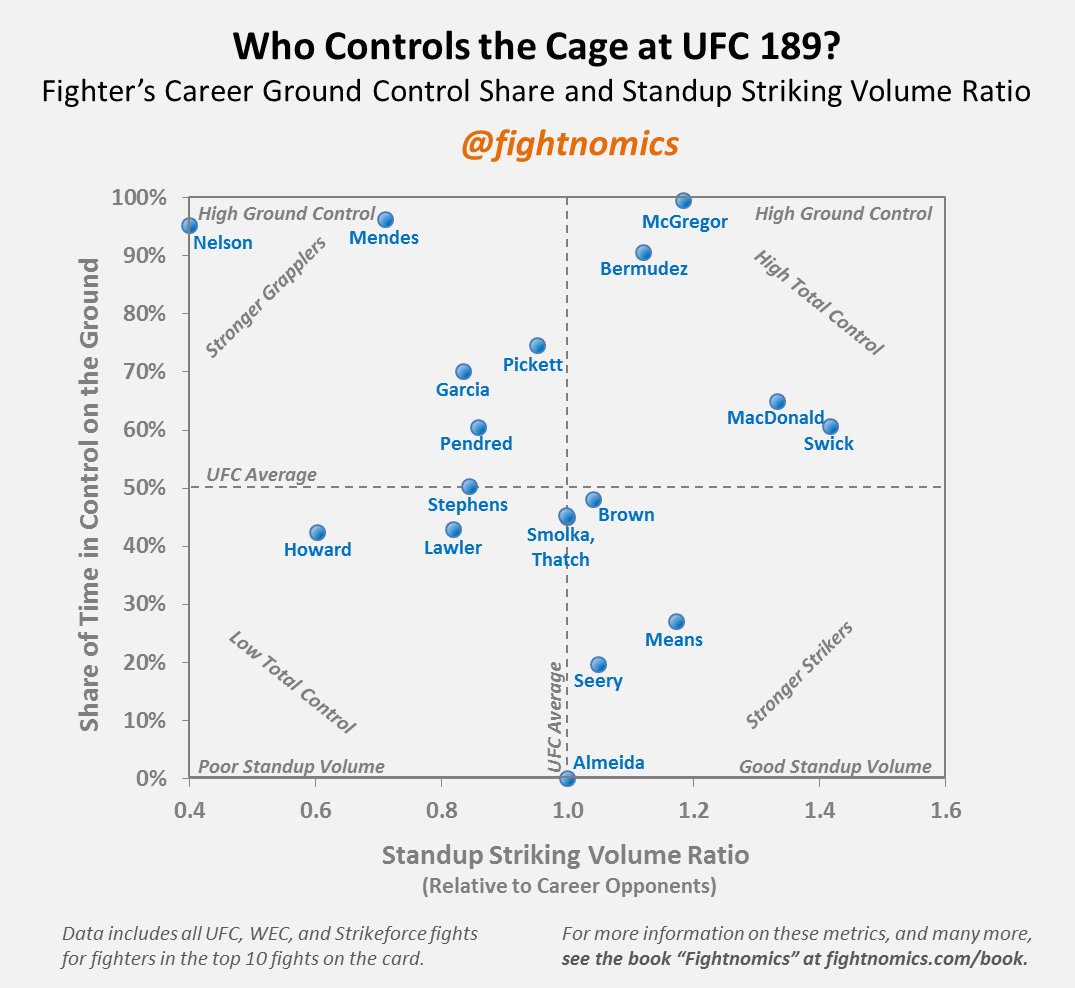By @fightnomics We’ve looked at pure striking stats in terms of power striking accuracy, and also total standup pace, and we’ve also looked at wrestling control. So let’s put it all together and see who really will be controlling the cage at UFC 189. The chart uses standup striking volume as a proxy for standing cage control. While we’ll get true motion capture data to understand striking position soon, for now we’ll settle for how much volume a fighter throws relative to their own opponents. Anything higher than 1.0 means a fighter is more aggressive on volume, while less than 1.0 usually means a counter-striker, a power-striker, or someone at a range disadvantage. Ditto on the ground. The share of ground control indicates how much of the time a fighter has spent on the mat where they are in control, as opposed to being controlled. As we’ll see, there have been some dominant wrestlers among the crew at UFC 189.
For more on these and other MMA performance metrics, get the book “Fightnomics.”
Masters of the Octagon Several fighters have excelled on the feet and also on the mat, and that includes none other than headliner Conor McGregor. McGregor’s standup striking sets him apart thanks to his high precision, power, and also pace, but what’s more surprising is his ground control. That’s because he’s never been taken down in his five UFC fights to date, and thanks to a few takedowns landed of his own he still has a perfect rating. However, that will likely change given his opponent this weekend. Other control fighters include Dennis Bermudez, who combines very solid wrestling credentials with a pressured pace of striking. Rory MacDonald fits the same bill, utilizing a sharp jab to pick apart opponents mixed in with takedowns. And lastly, Mike Swick has been very aggressive with his hands and yet more often than not has also been able to get the better of opponents on the mat. Of all the fighters in this quadrant, only Swick is an underdog, and that’s partly due to the questions stemming from a several year layoff. The Grapplers Gunnar Nelson is one of the most reserved strikers in the entire UFC, but his grappling credentials are likely what will set him apart against Brandon Thatch. The same goes for Chad Mendes, who while not lacking in striking skills does have a significant reach disadvantage to work against. But Mendes has been so dominant on the mat that he would be better-suited to rely heavily on his wrestling heading into the main event with McGregor. Among the slower strikers who can fall back on their wrestling, there is one big surprise: Brad Pickett. While Pickett is often described as a striker, he has utilized his wrestling on occasion with success. In fact, back in the WEC, Pickett landed 10 of 11 takedowns (!) in his defeat of current Flyweight champion Demetrious Johnson. Given that he is facing a strong striker, we might see Pickett turn heads by choosing to wrestle. Alex Garcia and Cathal Pendred are relative newcomers to the UFC, yet have both put together wins by grinding fights out. For Garcia, he faces a finesse striker, while Pendred faces a fellow grinder. The Aggressive Strikers There’s a barnburner brewing between Matt Brown and Tim Means, who both like to press the action. If neither man backs down, fans could be in for another Matt Brown classic. Keep in mind, however, that Brown is better equipped to use his wrestling if necessary, as he did against another striker in Stephen Thompson. Louis Smolka and Brandon Thatch have both pressed the action on the feet at times, only to be neutralized in different ways. Thatch has a clear striking advantage over Nelson but will be wary of takedowns as he learned recently in a loss to Bensen Henderson. Meanwhile Smolka will look to press forward to set up takedowns of his own. Neil Seery has been sharp with his hands to date, but definitely not as much on the mat. Facing Louis Smolka means he’ll probably be backpedaling while on his feet, so he’ll need all the precision in counter-striking that he has at his disposal to meet that threat. Thomas Almeida is a 10-to-1 favorite over Brad Pickett, as everyone is expecting the Muay Thai Striker to exploit his massive Youth Advantage against his aging opponent. But as we see here, Pickett’s wrestling could be a wild card that keeps this fight closer than fans are expecting. Lagging the Pack It’s strange to see Robbie Lawler falling into a low scoring bucket, but that’s partly because his career has been so long, and also that he spent time at Middleweight against top talent. Now back at Welterweight, Lawler has looked better than ever. He’s unlikely to utilize wrestling against Rory MacDonald, but Lawler should be more aggressive on his feet than he has been in the past. And that worked for him against MacDonald the first time they fought. Jeremy Stephens has the biggest mismatch in terms of cage control facing Bermudez. Fortunately, Stephens also packs a lot of power in his hands, while Bermudez has sometimes forgotten to be mindful of defense as he presses forward. This combination of factors could mean that Bermudez stifles Stephens, or more interestingly, that Stephens lands a big counter that puts Bermudez out. John Howard has lagged the pack, but may find new motivation in his losing streak that could mean he’s fighting for a roster spot. “Doomsday” hits very hard, so he’s a threat to be the first to finish Cathal Pendred. If we don’t see the knockout from Howard, it could be a slow grinding fight for both men. Interestingly, none of the fighters in this quadrant are favored, although Howard is closest as a pick ‘em currently. For information on getting the “Fightnomics” the book, go here.
